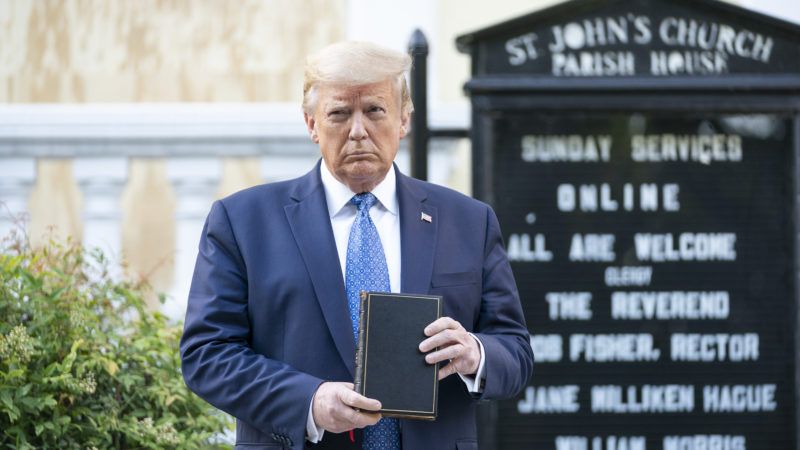National Guardsman Contradicts Trump Administration's Account of Use of Force Against Protesters
A National Guard officer will testify that the June 1 clearing of protesters outside the White House was "an unnecessary escalation of the use of force" and "deeply disturbing."

A National Guard officer will testify Tuesday at a congressional hearing that the June 1 clearing of protesters outside the White House was "an unnecessary escalation of the use of force" and "deeply disturbing to me, and to fellow National Guardsmen."
"From my observation, those demonstrators—our fellow American citizens—were engaged in the peaceful expression of their First Amendment rights," Adam DeMarco, a major in the D.C. National Guard, will tell the House Natural Resources Committee, according to his prepared remarks. "Yet they were subjected to an unprovoked escalation and excessive use of force."
DeMarco's testimony directly contradicts several of the Trump administration's shifting explanations for what happened on June 1, when law enforcement violently dispersed a crowd of protesters in Lafayette Square, across the street from the White House. After police cleared the crowds, President Donald Trump conducted a photo shoot of himself holding a Bible outside St. John's Church.
DeMarco and other National Guardsmen were deployed outside the White House on June 1, along with U.S. Park Police, Secret Service, and other federal law enforcement. A 7 p.m. curfew was in place in D.C. that evening.
DeMarco testifies that around 6 p.m., Attorney General William Barr and Gen. Mark Milley, the chairman of the Joint Chiefs of Staff, arrived.
"As the senior National Guard officer on the scene at the time, I gave General Milley a quick briefing on our mission and the current situation," DeMarco writes. "General Milley told me to ensure that National Guard personnel remained calm, adding that we were there to respect the demonstrators' First Amendment rights." (Milley has since apologized for appearing in Lafayette Square. "I should not have been there," he said. "My presence in that moment, and in that environment, created the perception of the military involved in domestic politics.")
At around 6:20 p.m., DeMarco continues, verbal warnings were given to the crowd to leave. But from where he was standing, about 20 yards away from the line of protesters, the warnings "were barely audible and I saw no indication that the demonstrators were cognizant of the warnings to disperse."
Law enforcement rushed the crowd at around 6:30 p.m. Videos showed law enforcement assaulting an Australian TV crew. Media and other observers also reported being tear gassed.
The Trump administration says that protesters were throwing items at law enforcement, which DeMarco testifies he did not see. Park Police also emphatically denied they fired tear gas, claiming that officers instead fired smoke canisters and pepper balls, the latter of which are also a chemical irritant. But DeMarco says that tear gas was indeed used.
"The Park Police liaison officer told me that the explosions were 'stage smoke,' and that no tear gas was being deployed against the demonstrators," he writes. "But I could feel irritation in my eyes and nose, and based on my previous exposure to tear gas in my training at West Point and later in my Army training, I recognized that irritation as effects consistent with CS or 'tear gas.' And later that evening, I found spent tear gas cannisters on the street nearby."
The Trump reelection campaign demanded media outlets issue a correction about any tear gas reporting. "Every news organization which reported the tear gas lie should immediately correct or retract its erroneous reporting," Tim Murtaugh, campaign communications director, said in a statement.
As Reason's Elizabeth Nolan-Brown pointed out at the time, whether tear gas was used is rather incidental to the larger issue of the government attacking protesters so the president can do a silly photo op. But the distraction served its primary purpose for the White House and conservative media: to muddy the waters enough that average news consumers might shrug their shoulders and ignore the whole thing.


Show Comments (199)